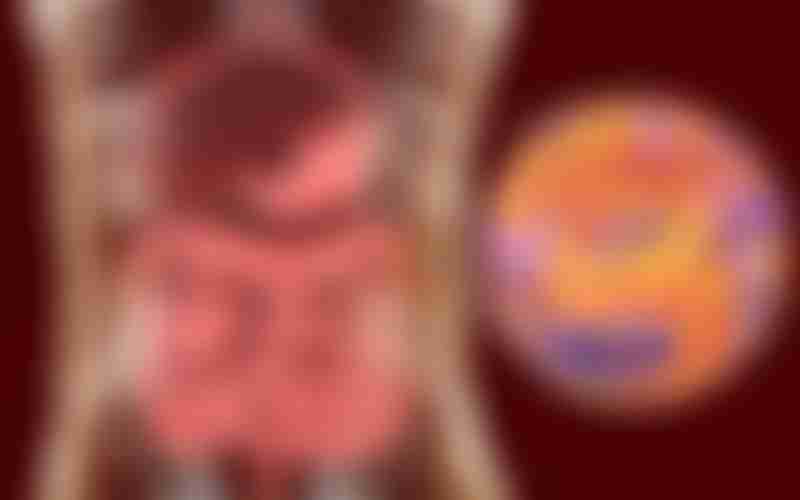The Latest in Stomach Cancer Research

Source: Shutterstock
Stomach cancer, or gastric cancer, is the third leading cause of cancer-related deaths worldwide, affecting approximately 1 million people and giving rise to 700,000 deaths every year. Across the globe, important life-saving research is being done to discover more about what causes this type of cancer and how best to prevent, detect and treat it.
Risk factors
Helicobacter pylori infection

Illustration of H. pylori bacteria in a human stomach. Source: Kateryna Kon/Science Photo Library
Helicobacter pylori is a type of gut bacteria that infects the stomach lining and can cause severe inflammation of the stomach. Infection with H. pylori is one of the strongest known risk factors for gastric cancer.
Recent studies have shown that a particular type of H. pylori, called the cytotoxin-associated gene A (cagA+) strain, is more strongly associated with the development of gastric cancer. cagA is a specialized protein produced by the H. pylori bacterium that interacts with numerous host proteins within the epithelial cells of the gastric mucosa. This interaction stimulates intracellular signaling pathways and processes involved in cancer formation, encouraging gastric epithelial cells to turn cancerous.
By uncovering the various mechanisms through which CagA promotes tumorigenesis, scientists are now looking at targeting these mechanisms for clinical interventions against H. pylori infections by the cagA+ strain.
Detection and diagnosis
Sentinel lymph node biopsy
In most types of cancer, it’s common for the cancer cells to spread to nearby lymph nodes. Conducting a tissue biopsy is one way to find out whether these structures contain any cancer cells. A standard diagnostic technique used to test the lymph nodes for cancer spread in melanoma and breast cancer is called sentinel lymph node biopsy (SLNB). This same procedure is also used in gastric cancer.
During the procedure, a blue dye and/or a radioactive tracer is injected near the primary gastric tumor. Subsequently, the surgeon uses a device to locate any lymph nodes that contain the tracer or are stained with the dye. The sentinel lymph node is defined as the first lymph node(s) to which the tumour drains. Once the surgeon is able to identify the sentinel lymph nodes using the dye or tracer, they can remove them to look for any signs of cancer.
If no cancer is found in the sentinel lymph node(s), it is unlikely that it has spread to other lymph nodes near the stomach. These other lymph nodes, which are located within the region of the stomach but are further from the primary tumor than the sentinel lymph node(s), are called regional lymph nodes. In this case, a full lymph node removal may not be required. However, if cancer is found in the sentinel lymph nodes, this indicates that the cancer may have spread to regional lymph nodes and possibly other nearby organs. Sentinel lymph node biopsy may help avoid more extensive lymph node resections.
This same procedure is currently being tested with gastric cancer. Recent studies have shown that SLNB is safe and effective for superficial and relatively small gastric cancers. Further research is needed to determine if this technique is appropriate for widespread clinical use in gastric cancer cases.
Novel gastric cancer biomarkers
With the success of various biomarker-driven targeted therapies, mounting research has gone into discovering novel biomarkers that are elevated in gastric cancers and can be targeted for personalized treatment. Examples of emerging molecular biomarkers in gastric cancer include FGFR2b and Claudin18.2. Therapeutic drugs targeting these emerging biomarkers are already being tested in clinical trials.
Researchers are also investigating blood-based markers that can be used for less-invasive early gastric cancer detection. These include nucleic acids, like circulating tumor DNA (ctDNA) and microRNAs (miRNAs) that are released by tumor cells into the blood. While promising, larger prospective studies are required to validate these circulating molecules as reliable biomarkers for early gastric cancer detection.
A breakthrough invention by scientists in Singapore is a non-invasive gastric cancer screening test called GASTROClear. This diagnostic test kit, which can detect both early- and late-stage gastric cancer with an accuracy of 87%, is the world’s first approved molecular blood test for early detection of gastric cancer. It works by detecting the levels of 12 miRNA biomarkers in the blood.
Treatment
Chemotherapy
Gastric cancer research on chemotherapy is looking into a variety of things, such as:
- New chemotherapy drug combinations: Combination drug therapy typically works better than single drug therapy and, therefore, is increasingly used for people with gastric cancer. For this reason, doctors and scientists are looking into many different chemotherapeutic combinations to see which would be most effective for people with gastric cancer.
- Novel drug delivery methods: Many studies are looking at infusing chemotherapy agents directly into the abdomen to see if it might work with fewer side effects. One such technique is hyperthermic intraperitoneal chemotherapy (HIPEC), which delivers high doses of heated chemotherapy drugs directly into the peritoneal cavity (the space that contains abdominal organs). This kills any cancer cells remaining in the abdomen after surgery. While HIPEC may be a promising treatment option for people with stage 4 cancer, further research needs to be done before HIPEC gains widespread acceptance.
Radiation therapy
To measure the doses of radiation a patient receives during radiation therapy, doctors use a medical device called a dosimeter. Clinical dosimeters are usually placed directly on or near the skin to estimate the amount of radiation in the target area, such as the abdomen. However, these dosimeters have limitations. They decrease the intended dose for the patient by absorbing radiation itself and do not take into account the radioactive dose being absorbed by the body.
For gastric cancer patients receiving radiotherapy, precisely targeting tumor tissue while minimizing damage to healthy surrounding tissue is vital. To ensure that a patient receives the right dose of radiation, a medical device called a dosimeter is used to measure and monitor the radiation delivered to the patient’s body during treatment.
Commonly used clinical dosimeters, such as metal-oxide semiconductor field-effect transistors, are usually placed directly on or near the patient’s skin in order to estimate the amount of radiation in the target area during a treatment session. However, the dosimeters itself absorb some radiation in the process, thereby reducing the intended dose for the patient. Furthermore, because they are placed externally, these dosimeters do not take into account the radioactive dose that is internally absorbed by the body and reaching the cancer cells in the gastrointestinal tract of the patient.

The novel X-ray dosimeter comes in the form of an ingestible capsule, a common size for many supplements and medicines. Source: NUS News
To combat these problems, researchers from Singapore and China invented a novel X-ray dosimeter that comes in the form of an ingestible capsule. This device can measure X-ray doses delivered to cancer cells in the stomach roughly five times more accurately than current standard methods. The dosimeter can also detect physiological changes in pH and temperature during gastrointestinal radiotherapy. These biochemical indicators reflect whether the radiotherapy is effective and if there are any negative reactions to the treatment.
The team is now looking to bring their innovation into clinical use, with further research being done to ensure that the device is safe and effective for widespread clinical use. They are also exploring its application in ailments other than gastrointestinal cancers. This includes cancers of the brain and thyroid, as well as in non-cancer conditions like acid reflux.
Targeted therapy drugs
Gastric cancer research is making good progress in the field of targeted therapy, which offers a more precise and effective treatment option that minimizes harm to healthy cells.
There are many targeted drugs currently in development. Some are targeting the protein biomarker human epidermal growth factor receptor 2 (HER2), which is often overexpressed in advanced gastric cancers. In recent years, trastuzumab and trastuzumab deruxtecan have received FDA approval for clinical use. In the meantime, numerous clinical trials are underway to evaluate whether other drugs, such as lapatinib and margetuximab, can also be used to treat gastric cancer.
Gastric cancer research is also looking into identifying novel molecular targets and developing therapeutic agents that attack these targets. This effort has led to the emergence of zolbetuximab, a monoclonal antibody drug that targets a protein called Claudin18.2. Claudin18.2 is a protein biomarker that is overexpressed in 14% to 87% of gastric cancers and can be found on the surface of malignant epithelial cells in the gastric mucosa.
> Learn more about the novel targeted therapy drug zolbetuximab
Zolbetuximab is currently being studied in multiple clinical trials, either as a monotherapy or in combination with other drugs, such as chemotherapeutic and immunotherapeutic agents. If approved, it will be a first-in-class therapy for gastric and gastroesophageal cancers.
Another promising new drug called bemarituzumab, which targets the biomarker FGFR2b, is also being tested in Phase III clinical trials. If approved, this novel FGFR2b inhibitor may transform the treatment of FGFR2b-positive advanced gastric cancers.
Immunotherapy

Source: Shutterstock
The field of immunotherapy is an expanding area for gastric cancer research. Drugs called immune checkpoint inhibitors (ICIs) have shown exceptional efficiency in a subpopulation of people with advanced gastric cancer. This includes pembrolizumab and nivolumab, two ICIs recently granted FDA approval for gastric cancer treatment. Ongoing research is focused on studying other ICIs, developing new immunotherapeutic agents and identifying predictive biomarkers that will help to identify gastric cancer patients most likely to benefit from immunotherapy.
Gastric cancer is a challenging disease that can have a major impact on anyone. However, there is good news for individuals who may be at a higher risk of developing this condition. The latest developments in gastric cancer research are bringing about advancements in the diagnosis and treatment of this disease. With these advancements, earlier detection is more likely, which may lead to more effective treatment options and ultimately, better outcomes. By staying up to date on the latest developments in this field, individuals can take more proactive steps to protect their health and well-being.